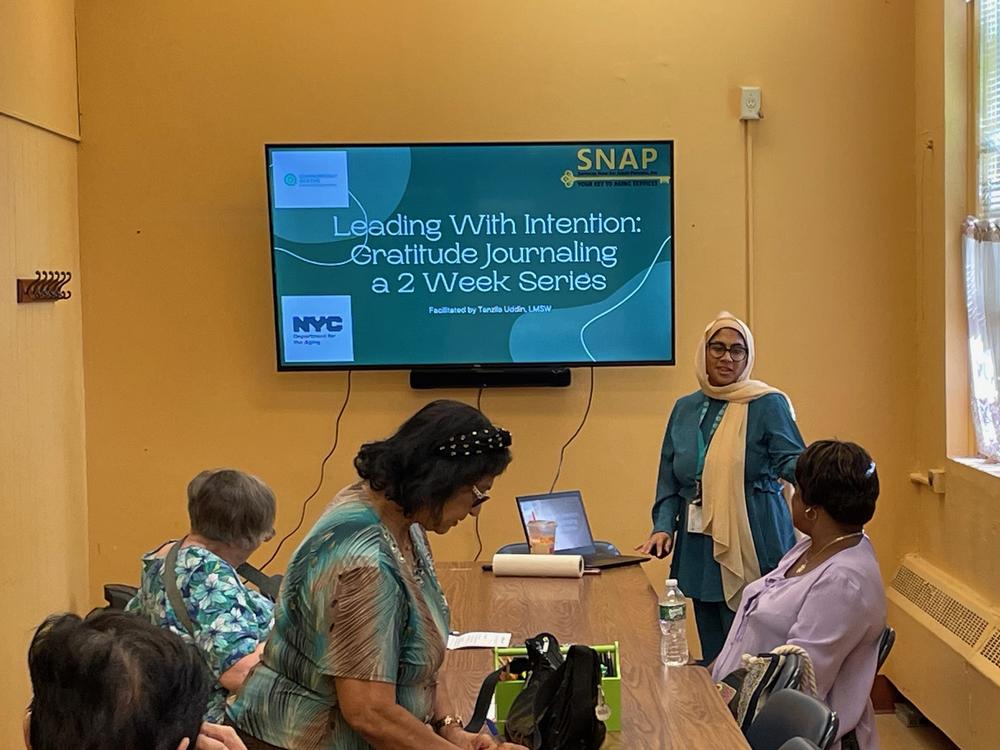Section Branding
Header Content
Call it 'stealth mental health' — some care for elders helps more without the label
Primary Content
The pandemic drew a lot of attention to young people's mental health. But older people have suffered, too. Many are struggling with loneliness, anxiety, or substance abuse.
Fewer than half of older adults who need mental health care get it, according to the National Council on Aging.
"One reason is that professionals are under-trained to treat the mental health needs of older adults," says Regina Koepp, a clinical psychologist based in Vermont, and the founder of the Center for Mental Health and Aging. "Many professionals feel quite incompetent and will say that they just don't treat older adults."
And that leaves would-be clients scrambling.
Another issue is insurance coverage and cost. Medicare doesn't reimburse all types of mental health provider — such as counselors — although that is due to change next year. And many therapists don't work with insurers.
Not a just normal part of aging
Koepp says in addition, stereotypes about aging can also interfere with care.
"There's an idea that depression is normal with aging, or anxiety is normal with aging, when in fact these conditions are not normal with aging," she says, adding that they can be treated.
Koepp says older people benefit greatly from therapy.
But sometimes you have to be subtle about the approach. Because the words "mental health" still can carry plenty of stigma for older generations.
New York City has one of the largest and most diverse populations of older adults in the country, says Lorraine Cortés-Vázquez, commissioner for the New York City Department for the Aging.
"When you're looking at mental health you've got to bring all of that perspective into the conversation," Cortés-Vázquez says. "Because there are some cultures that are more risk averse to mental health services."
So she says New York City is bringing mental health services to older people, where many of them are — in senior centers.
It offers services in multiple languages, including Spanish, Cantonese, and Yiddish. But Cortés-Vázquez says running a successful mental health program isn't just about speaking someone's language. It's about understanding their culture.
"You really need to know what the wants and needs [of these populations] are, and what drives certain people, before you can engage them in using a service that might be unfamiliar to them," she says.
She says anything related to mental health is often unfamiliar or uncomfortable. So mental health services at senior centers aren't always labeled that way.
You could call this approach stealth mental health.
In early August, at a senior center in Queens Village in New York City, social worker Tanzila Uddin is holding the second of two workshops on journaling and gratitude.
"Today we're going to talk about self-reflection," she announces at the start.
About a dozen men and women from various ethnic backgrounds are in attendance. They range in age from their 60s to their 90s. The Department for the Aging has found workshops like this are a way of getting older people to open up on everything from their physical health to depression to problems with bossy adult children.
"It's a different generation, different thoughts...different than me," says one workshop participant, who is 92.
Toward the end of the workshop, this man tells Uddin he'd like to talk to her privately about his relationship with his son.
She agrees and reminds everyone this is an option.
"You can always make an appointment, we'll sit down, we'll be totally private, and we can really connect on what's happening," Uddin says.
In the last few years the Department for the Aging has expanded this model of care to 88 senior centers across New York City. It's free to seniors.
Cost and access hurdles
But things are different in the private market for mental health therapy.
Susan Ford is 76 and lives in San Francisco. Most of her income comes from Social Security.
"I was really in a place of needing something that was very affordable," she says.
She's getting a reduced rate working with a therapist in training, a master's degree student at a local institute. She says working through the challenges of this phase of her life has been hugely helpful.
Ford believes every older person deserves the same opportunity.
"If we don't have care that will help us, society is asking us not to be as alive as we can be," she says.
She says human beings never stop growing, whatever their age.
Copyright 2023 NPR. To see more, visit https://www.npr.org.

